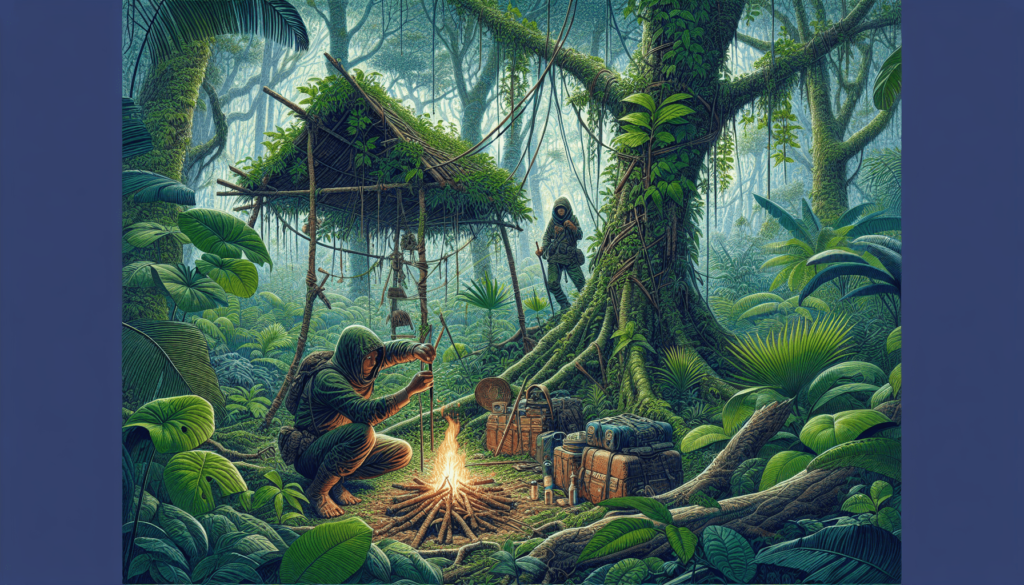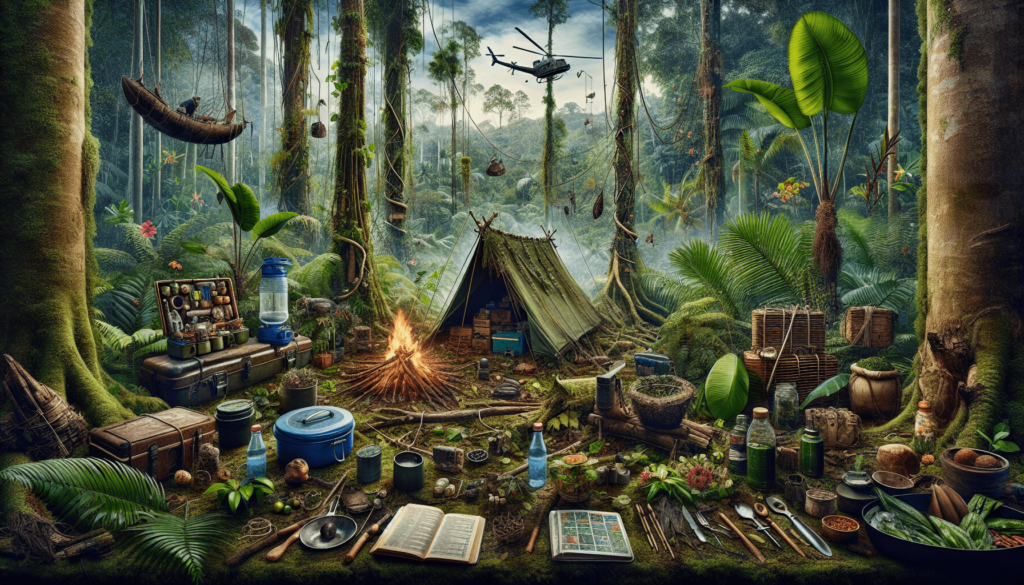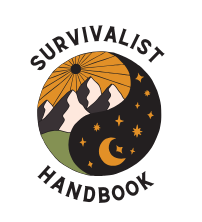Are you ready to embark on an adventure in the lush and unpredictable jungles of the tropics? If so, then “Jungle Survival: Essential Tactics For The Tropics” is the article you need to read. This captivating piece from “The Survivalist Handbook” will equip you with the skills and knowledge necessary to not just survive, but thrive in the wild. Whether it’s building a fire, finding sustenance, or navigating through dense foliage, these essential tactics will ensure your success in the challenging and fascinating world of the jungle. So get ready to dive into this comprehensive guide and prepare yourself for the ultimate jungle experience.

Jungle Navigation
Navigating through the dense jungle can be a challenge, but with the right skills and knowledge, you can find your way to safety. One of the first things you need to learn is map reading and orientation. Having a good map of the area is essential. Familiarize yourself with the landmarks and natural features on the map, as they can serve as points of reference while navigating.
When it comes to actually moving through the dense vegetation, it’s important to be observant and use your senses. Look for openings or game trails that can lead you in the right direction. Listen for the sound of nearby water sources or animal calls, as they can point you towards civilization or a water supply. Lastly, trust your instincts and intuition. Sometimes your gut feeling can guide you in the right direction, so always stay alert and aware of your surroundings.
Building Shelter
Finding or building a shelter is crucial for surviving in the jungle. The key is choosing the right location for your shelter. Look for an elevated spot that is away from flood-prone areas and has good drainage. Avoid setting up camp near dead trees or areas with loose soil, as they can be hazardous.
When constructing your shelter, prioritize waterproofing. The tropical rainforest can experience heavy rainfall, so it’s important to stay dry. Utilize natural materials such as large leaves, branches, and vines to build a sturdy and waterproof structure. Make sure your shelter is well-insulated to protect against both rain and insects.
Finding Water Sources
Water is essential for survival, especially in the hot and humid jungle. Learning to identify water sources and purify water is crucial. Look for streams, rivers, and natural springs. Keep in mind that not all water sources are safe to drink, so it’s important to purify the water before consumption.
There are various methods to purify water in the jungle. Boiling is the most effective way to kill harmful bacteria and parasites. If you don’t have the means to boil water, you can use water purification tablets or a portable water filter. Remember to collect rainwater whenever possible, as it is usually safe to drink without purification.
Sourcing Food
Finding food in the jungle can be challenging, but it’s not impossible. Start by learning to identify edible plants and fruits. There are many nutritious plants available in the jungle such as banana trees, coconut palms, and bamboo shoots. Familiarize yourself with these plants and their edible parts.
Fishing and trapping can also provide a source of sustenance. Learn basic fishing techniques using improvised hooks or traps. Insects and small animals can be caught using snares or simple traps constructed from natural materials. Always prioritize safety and respect local laws when hunting for food.

Fire Starting
Fire is essential for cooking, keeping warm, and signaling for help. In the jungle, it can be challenging to find dry tinder and fuel, but it’s not impossible. Start by collecting dry leaves, twigs, and bark. These materials can be used as tinder to get your fire started.
Choosing the right fire site is crucial. Look for a location that is sheltered from wind and has good ventilation. Clear the area of any dry vegetation that could catch fire easily. Always keep a safe distance from your fire to prevent accidents.
Fire safety and maintenance are equally important. Never leave your fire unattended, and ensure it is fully extinguished before leaving your campsite. Water can be used to put out the fire, but make sure to completely douse the embers and stir the ashes to prevent reignition.
Dealing with Tropical Wildlife
Encountering wildlife in the jungle can be both fascinating and potentially dangerous. It’s important to understand how to prevent and handle encounters with different species. Learn to identify venomous snakes and understand their behaviors to avoid snakebites. Be cautious and avoid disturbing nests or dens of dangerous animals.
When it comes to insects, use mosquito repellent to protect yourself from mosquito-borne diseases. It’s also important to avoid touching or getting too close to unknown insects, as some can be venomous or carry diseases.
If you come across marine life while near water sources, exercise caution and respect their space. Avoid touching or provoking marine animals, as they are wild creatures and may become aggressive if threatened.
First Aid in the Jungle
Knowing basic first aid skills can mean the difference between life and death in the jungle. Familiarize yourself with common injuries and their treatments. Learn how to stop bleeding, dress wounds, and perform CPR if necessary. It’s also important to have a well-stocked first aid kit specific to jungle conditions.
In addition to physical injuries, tropical diseases can pose a threat in the jungle. Be aware of common diseases such as malaria, dengue fever, and Zika virus. Take preventive measures such as using mosquito nets, wearing protective clothing, and applying insect repellent.
Stay updated on immunizations and consult with a medical professional before venturing into the jungle. It’s also a good idea to learn basic survival medicine such as treating dehydration, diarrhea, and fever.
Survival Skills for Extreme Weather
The jungle can experience extreme weather conditions, so being prepared is essential. Protect yourself from torrential rain by carrying a waterproof poncho or tarp that can be used as a makeshift shelter. It’s also important to learn to identify potential flash flood areas and move to higher ground if necessary.
Storms and hurricanes are common in tropical regions. Stay informed about weather conditions and have a plan in place to seek shelter if a severe storm is approaching. Reinforce your shelter and secure loose items to prevent them from being blown away.
The hot and humid climate of the jungle can be challenging to endure. Protect yourself from sunburn and heat exhaustion by wearing lightweight, breathable clothing, and a wide-brimmed hat. Stay hydrated by drinking plenty of water and take regular breaks to rest and cool down in the shade.
Rescue and Signaling
In the event of an emergency, it’s important to know how to signal for help and increase your chances of being rescued. Creating effective SOS signals using smoke, mirrors, or improvised materials can alert potential rescuers of your presence. Carry a signaling device such as a whistle or mirror for this purpose.
Using light to signal for help is also effective, especially at night. Learn the morse code for SOS and use a flashlight or headlamp to send the signal. Flash the light in three short bursts, followed by three long bursts, and then three short bursts again.
If you’re in an area with potential rescuers nearby, attracting attention can be crucial. Make noise by shouting or using a whistle. Build a signal fire using green vegetation or a brightly colored item to increase its visibility.
Psychological Preparedness
Surviving in the jungle not only requires physical skills but psychological preparedness as well. Staying calm in stressful situations is vital for making sound decisions. Practice deep breathing exercises and mindfulness techniques to manage stress and anxiety.
Overcoming fear is another important aspect of survival. The jungle can be a daunting and unfamiliar environment, but staying positive and confident will help you overcome challenges. Focus on the tasks at hand and celebrate small victories along the way.
Maintaining a positive mindset is crucial for your overall well-being. Remind yourself of your strength and resilience. Remember, every challenge you overcome in the jungle is a testament to your survival skills and resourcefulness.
In conclusion, jungle survival requires a combination of essential skills and the right mindset. By learning navigation techniques, building shelters, finding water and food sources, mastering fire starting, understanding wildlife encounters, providing first aid, preparing for extreme weather, signaling for rescue, and staying psychologically prepared, you can increase your chances of surviving and thriving in the tropical wilderness. With the right preparation and knowledge, you can embrace the adventure of the jungle while staying safe and secure.

